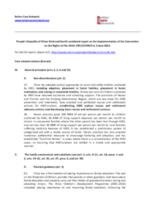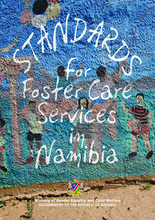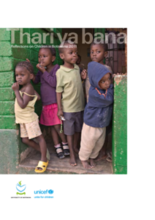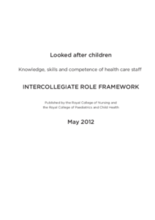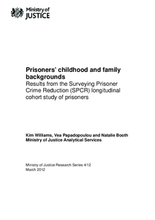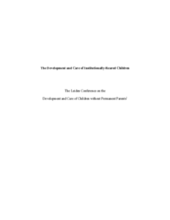Displaying 2001 - 2010 of 2223
The study is designed to identify whether effective caregiving mirrors strong parenting among typical parents or whether a set of additional skills is required to parent foster children responsively. Some of the principle features of quality caregiving for children are described particularly in the domains of family integration, relationships with biological parents, and support for children's special needs.
The People’s Republic of China issued its third and fourth combined report on the implementation of the Convention on the Rights of the Child in June 2012. This extract of the report focuses on sections relevant to children's care and in particular those addressing Family Environment and Alternative Care
The Ministry of Gender Equality and Child Welfare (MGECW) of Namibia released the 2012 Foster Care Standards and Guidelines which are aimed to guide social workers and other service providers in recruiting, assessing, training, matching, supporting, supervising and monitoring foster care services. The Foster Care Guidelines assist in translating the Standards into day-to-day practices. These Standards and Guidelines with accompanying training manuals were prepared to strengthen supported family-based care for vulnerable and marginalized children.
On May 2, 2012, in preparation of the Family Strengthening and Alternative Care Conference for Francophone Sub-Saharan Africa in Dakar, Senegal, BCN and the regional planning committee convened experts and practitioners to present and discuss the efforts to implement the Guidelines for the Alternative Care in the region. Watch this video for presentations, country level experience from Togo, and discussions on the pressing issues facing implementation in the region.
Collection of research and reflections on children’s issues in Botswana articles in the various chapters of the publication have been structured to follow the life cycle of the child as she or he grows and is faced with different issues that need to be addressed: young child survival; child development; child protection; HIV and AIDS; and child-sensitive social protection.
This document provides an outline for the competencies, training and skills needed by healthcare staff to work with looked after children at different professional levels in the UK. It recognizes that all health staff should have access to appropriate training, learning opportunities, and support to fulfill their roles and responsibilities, particularly when it comes services provided to looked after children.
This comprehensive policy report by the Annie E. Casey Foundation summarizes what is known about kinship care in the United States, identifies the problems and issues these families face, and recommends how best to support caregivers as they step up to take responsibility for children in their extended families and communities.
This study used the National Survey of Child and Adolescent Well-being (NSCAW, long term foster care general sample) data set to examine foster child and caregiver characteristics, and the caregiver–child relationship as a predictor of placement stability.
This report presents findings of a study on the childhood and family backgrounds of 1,435 participants who were newly incarcerated in 2005 and 2006 in the United Kingdom. The report has a special focus on the experiences of abuse and care placement in childhood.
This article briefly summarizes the literature on elements of research, practice, and policy pertaining to the development and care of children raised in institutions. It covers such children’s development while they reside in institutions and after their transition to adoptive or foster families.

